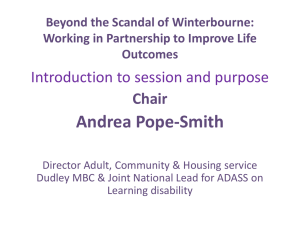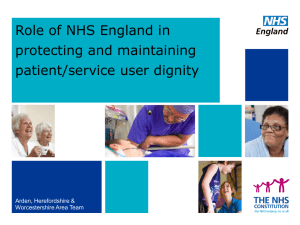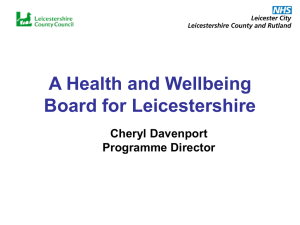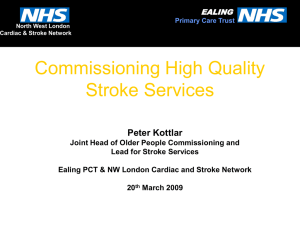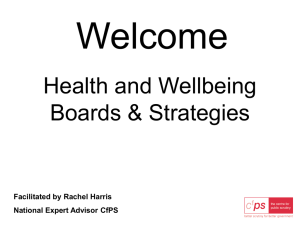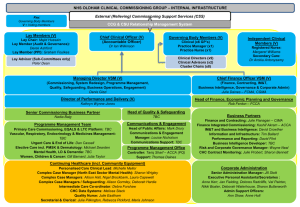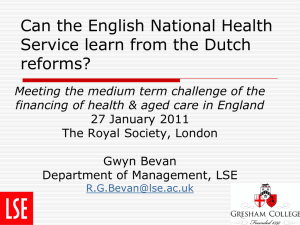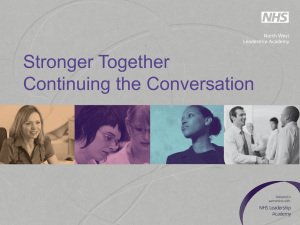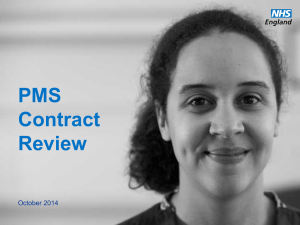Transition - Family Nurse Partnership
advertisement
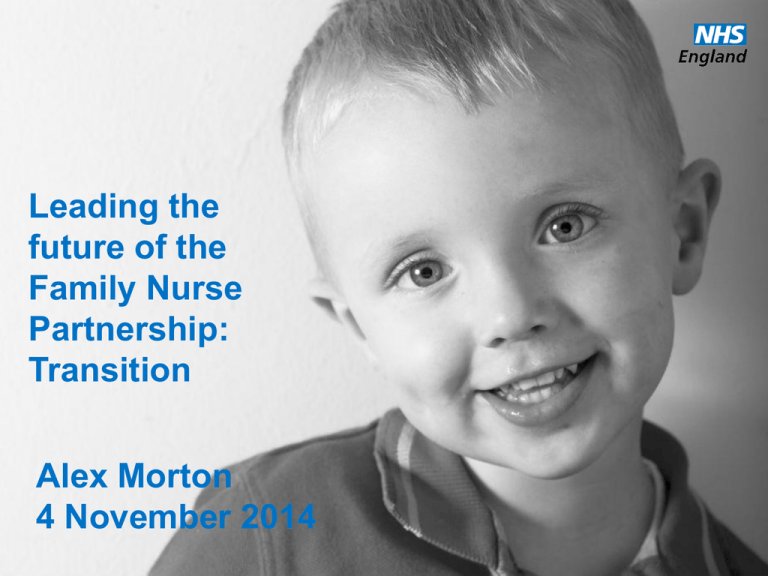
Leading the future of the Family Nurse Partnership: Transition Alex Morton 4 November 2014 www.england.nhs.uk Overview • NHS England - how we work with FNP • Transfer of 0-5 years commissioning responsibilities to Local Authorities from NHS England • Opportunities for commissioning in the future www.england.nhs.uk Public Health Commissioning 3 www.england.nhs.uk • NHS England is responsible for the direct commissioning of a range of public health services as set out in the Section 7a Agreement. • We commission through our NHS England area teams, working with local communities and providers • The services we commission for 0-5 are set out in service specification 27 and the annual value of our contracts for 0-5 services is in excess of £800M • The Family Nurse Partnership service is an integral part of this commissioning and services for local populations • By April 2015 we aim to have 16000 Family Nurse Partnership places Commissioning the healthy child programme • Commissioning the healthy child programme is a fundamental part of our public health commissioning • Our overall aim is to improve outcomes for children and their families • Improving the quality of services offered to patients and families in the early years of a child’s life make a real difference. It has been shown that high quality intervention, prevention and support is vital to giving children the best start in life • We work through our Area Teams to commission the Healthy Child Programme 0-5 years. A single, national team within each Area Team commission for the Family Nurse Partnership Services • In developing the local commissioning plans Area Teams work in partnership considering Joint Strategic Needs Assessments and Joint Health and Wellbeing Strategies with local communities and Health & Wellbeing Boards • FNP gives www.england.nhs.uk us all the opportunity to focus where people need us most NHS England priorities We use evidence based specifications & outcome frameworks Health Visitor Service Specification 2014/15 sets the strategic framework for commissioning services: work in partnership with parents & agencies in provision of intensive multi-agency targeted packages where there are identified complex health needs or safeguarding needs. - ‘ On-going support from the health visiting team, plus a range of local services working together and with families, to deal with more complex issues over a period of time. These include services provided by ….. the Family Nurse Partnership ’ - The 2015/16 HV specification updates: ‘For providers this will support an integrated approach to meeting the needs of young children and their families and the delivery of improved outcomes. HVs will lead delivery of5 the HCP and work in partnership with . . . www.england.nhs.uk Family Nurse Partnership (FNP) colleagues .’ The Public Health Outcomes Framework and NHS Outcomes Framework include outcome indicators that are relevant to the Healthy Child Programme 0-5 years, health visiting and FNP and form part of the overall assurance to NHS England. - Health Improvement including breastfeeding initiation, child development at 2-2½ years, obesity prevalence in reception year children, - Health Protection including MMR immunisation (by age 2 years) - Public health and preventing premature mortality including infant mortality and mean decayed missing filled teeth in 5 year old children - Improving the wider determinants of health including Children achieving a good level of development at Early Years Foundation Stage NHS England – supporting young families FNP Places 16500 16000 15500 15000 14500 14000 13500 www.england.nhs.uk FNP places Apr-15 Feb-15 Dec-14 Oct-14 Aug-14 Jun-14 Apr-14 13000 • In commissioning services we aim to improve outcomes • Much of our focus has been on increasing the number of Health Visitors and FNP places, as an evidence based way of improving outcomes • To date, 875 new FNP places have started in 2014/15 & in line with the agreed trajectories bring the current total number of places to 14,025. • A further 1325 places were on track to start delivery at the end of October bringing the total to 15,350 • We aim to achieve 16,000 places by April 2015, so that 1 in 4 of the eligible population will have access Transfer of commissioning responsibilities We are working with local authorities on safe transfer of commissioning responsibilities from NHS England to Local Government which will transfer on 1 October 2015. The following commissioning responsibilities will transfer to local authorities The 0-5 Healthy Child Programme (Universal/universal plus) which includes: Health visiting services (universal and targeted services); Family Nurse Partnership services (targeted service for teenage mothers). NHS England will retain commissioning responsibilities: Child Health Information Systems (CHIS) in order to improve systems nationally. This will be reassessed in 2020; The 6-8 week GP check (also known as the Child Health Surveillance) www.england.nhs.uk Transfer of commissioning responsibilities • NHS England’s aim is to maintain stability of service delivery whilst continuing the planned improvements in outcomes and modernisation of the workforce and we want to limit risks to provider organisations, healthcare professionals, children and their families. • Partnership working between DH, NHS England, PHE, LGA and other LG representative organisations (SOLACE, ADPH, ADCS) central to the successful transfer - nationally and locally • Our shared purpose and priority is to ensure safe effective transfer of commissioning responsibilities which provides commissioners of the future with the greatest opportunity to continually improve services for children. • We collectively have strengthened governance to reflect the work we need to do to ensure safe transfer. There is a comprehensive programme of work. The transfer is focussing on 0-5 commissioning as a whole. There are 4 key work-streams supported local, regional and national level • Finance & Contracting Workforce • Communication & Engagement Information & IT www.england.nhs.uk Transfer of commissioning responsibilities • We are keen to support the system in an effective transfer, recognising we are building on a firm foundation • LAs can expect: • Support from Area Teams in understanding the current commissioning responsibilities we hold • To be able to access great evidence based information on commissioning 0-5 services including FNP • To understand from the Department of Health indicative baseline allocations, with time to comment ahead of grant allocations • To be able to access regional oversight groups to feed in comments and views • To understand the indicative timeline for transfer and checkpoints along the way • To be able to access supportive information such as Fact Sheets and specific guidance such as NHS England contracting guidance • Our shared purpose and priority is to ensure safe effective transfer of commissioning responsibilities which provides commissioners of the future with the greatest opportunity to continually improve services for the most vulnerable. www.england.nhs.uk A commissioning point to leave you with There are some very clear benefits of Local Authorities commissioning services for 0-5 years: Healthy Child Programme And the evidence base shows we can make a difference through early intervention and public health approaches. There are economic & social arguments for investing in childhood. • The Family Nurse Partnership estimated savings five times greater than the cost of the programme in the form of reduced welfare and criminal justice expenditures; higher tax revenues and improved physical and mental health Marmot showed that of c. 700,000 children born in 2010, if policies could be implemented to eradicate health inequalities, then each child could expect to live 2 years longer Child poverty has short, medium and long term consequences for individuals, families, neighbourhoods, society and the economy. These consequences relate to health, education, employment, behaviour, finance, relationships and subjective well-being. Working in partnership will make a difference www.england.nhs.uk

